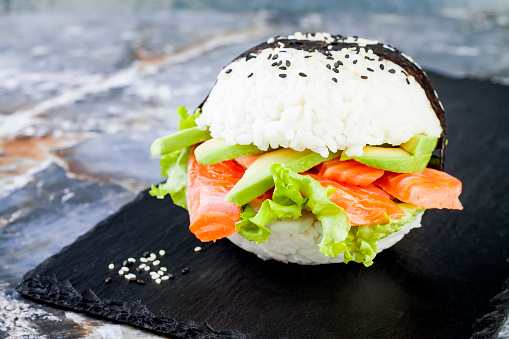
Sushi burgers are the new food trend
A few years ago, New Yorkers were lining up to get a so-called “ramen burger,” in which the bun is replaced with nests of noodles. The food trend of the time now has a successor: the sushi burger is very popular on the internet.
The sushi burger is structured like a normal burger. The difference is that the filling is pressed between two slices of rice. In between, there are usually typical sushi fillings such as raw fish or soft-shell crabs, but also beef and toppings such as avocado, spicy mayo, and pickled ginger.
The sushi burger comes from Japan. The dish originally comes from the Japanese burger chain MOS. The first rice burgers were found there sometime in the eighties. Now sushi burgers are being celebrated on social media. We can be curious to see when the pretty appetizers will be on Swiss restaurant menus – but the sushi burger will probably remain more of an internet phenomenon.
How the Internet Influences What We Eat
Social media has significantly transformed so many aspects of how we live in a relatively short period of time. Our nutrition from the food we eat is one frequently underappreciated aspect of social media’s influence on overall changes to things like relationships and the workplace.
Can you eat healthily while using social media apps? Here are some advantages and disadvantages of social media’s impact on eating, as well as some tips for curating a nutritious feed. We’ve all heard dire predictions about how social media will change our lives for the worse. But if done properly, following your favorite accounts could have a beneficial effect.
Inspires and motivates
On social media, there is a delicate line among aspirational content and blatantly unrealistic content, but if you follow people who set a good example, you could feel inspired to make changes for the better.
Positively Influences The Food Community
The capacity of social media to unite people with similar interests is one of its many charms.
Whether you love tropical fruits or are just starting a low-carb diet, it’s simple to locate people who share your interests online.
Social media does, however, have some negative aspects as well.
Be mindful of these potential drawbacks while you spend time on various platforms.
Overconsumption May Result From Distracted Eating
Social media scrolling itself can have a negative impact on eating habits rather than just the posts that are posted there.
Generates unrealistic expectations and beliefs
Let’s face it: social media isn’t exactly known for establishing reasonable standards.
Influencers and regular people can both use internet platforms to highlight the greatest aspects of their lives, particularly their eating routines.
Advertising Has a Bigger Impact Than We Might Think
Despite our desire to believe we are resistant to advertising, businesses utilize it because it is effective.
Advertising is becoming more customized right now with the targeted ads that are being shown to you on social media based on your personal information.
Could Support Eating Disorders
Numerous studies have demonstrated that social media can negatively affect our attitudes toward food, especially in younger age groups.


